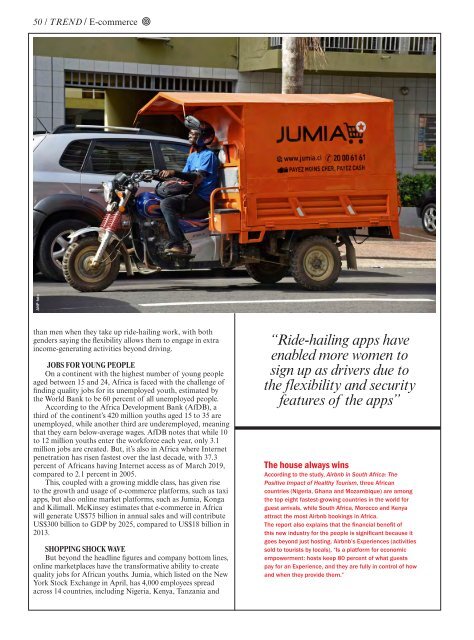July-2019
July-2019 Issue
July-2019 Issue
You also want an ePaper? Increase the reach of your titles
YUMPU automatically turns print PDFs into web optimized ePapers that Google loves.
50 / TREND / E-commerce<br />
TREND / 51<br />
ANP foto<br />
than men when they take up ride-hailing work, with both<br />
genders saying the flexibility allows them to engage in extra<br />
income-generating activities beyond driving.<br />
JOBS FOR YOUNG PEOPLE<br />
On a continent with the highest number of young people<br />
aged between 15 and 24, Africa is faced with the challenge of<br />
finding quality jobs for its unemployed youth, estimated by<br />
the World Bank to be 60 percent of all unemployed people.<br />
According to the Africa Development Bank (AfDB), a<br />
third of the continent’s 420 million youths aged 15 to 35 are<br />
unemployed, while another third are underemployed, meaning<br />
that they earn below-average wages. AfDB notes that while 10<br />
to 12 million youths enter the workforce each year, only 3.1<br />
million jobs are created. But, it’s also in Africa where Internet<br />
penetration has risen fastest over the last decade, with 37.3<br />
percent of Africans having Internet access as of March <strong>2019</strong>,<br />
compared to 2.1 percent in 2005.<br />
This, coupled with a growing middle class, has given rise<br />
to the growth and usage of e-commerce platforms, such as taxi<br />
apps, but also online market platforms, such as Jumia, Konga<br />
and Kilimall. McKinsey estimates that e-commerce in Africa<br />
will generate US$75 billion in annual sales and will contribute<br />
US$300 billion to GDP by 2025, compared to US$18 billion in<br />
2013.<br />
SHOPPING SHOCK WAVE<br />
But beyond the headline figures and company bottom lines,<br />
online marketplaces have the transformative ability to create<br />
quality jobs for African youths. Jumia, which listed on the New<br />
York Stock Exchange in April, has 4,000 employees spread<br />
across 14 countries, including Nigeria, Kenya, Tanzania and<br />
“Ride-hailing apps have<br />
enabled more women to<br />
sign up as drivers due to<br />
the flexibility and security<br />
features of the apps”<br />
The house always wins<br />
According to the study, Airbnb in South Africa: The<br />
Positive Impact of Healthy Tourism, three African<br />
countries (Nigeria, Ghana and Mozambique) are among<br />
the top eight fastest-growing countries in the world for<br />
guest arrivals, while South Africa, Morocco and Kenya<br />
attract the most Airbnb bookings in Africa.<br />
The report also explains that the financial benefit of<br />
this new industry for the people is significant because it<br />
goes beyond just hosting. Airbnb’s Experiences (activities<br />
sold to tourists by locals), “Is a platform for economic<br />
empowerment: hosts keep 80 percent of what guests<br />
pay for an Experience, and they are fully in control of how<br />
and when they provide them.”<br />
Uganda. It has created thousands of job opportunities in the<br />
six years it has been operating through the more than 50,000<br />
partners it works with in logistics, customer care and other<br />
support services. In Kenya alone, Jumia employs 700 people<br />
with an average age of 26, and it works with nearly 30,000<br />
independent, commission-based sales agents and logistics<br />
partners across the country.<br />
MOBILITY MATTERS<br />
Meanwhile, Uber has close to 10,000 active drivers in<br />
Kenya, Uganda and Tanzania, while Bolt (formerly Taxify) has<br />
“tens of thousands” of taxi and motorcycle drivers in Kenya,<br />
according to the company’s Regional General Manager East<br />
Africa Shivachi Muleji. “Two years ago, about half of our drivers<br />
were joining from the traditional taxis but we’ve now<br />
on-boarded more new drivers to the platform,” he says. “A<br />
majority of the drivers are below 35, with a good number fresh<br />
out of college.”<br />
On average, drivers on ride-hailing apps in Kenya take<br />
home about US$350 per month, which is slightly above the<br />
national average of US$300 per month for drivers. “We have<br />
people who would otherwise still be job hunting who are now<br />
generating an income. They can support themselves and feed<br />
their families,” says Muleji. “Kenya is still at the dawn of the<br />
cab-hailing industry. We’re likely to see a lot of opportunities<br />
in the coming years as technology disrupts how people move<br />
around in a more efficient, safe and cheaper way.”<br />
A report released by the Boston Consulting Group (BCG),<br />
How Online Marketplaces Can Power Employment in Africa,<br />
validates Muleji’s outlook, estimating that online marketplaces<br />
could create three million new jobs in Africa by 2025; roughly<br />
one job for every 15 unemployed workers (aged 15 to 24). “We<br />
estimate that the number of Africans directly employed by<br />
online marketplaces – workers such as platform developers<br />
and operations and marketing personnel – will reach around<br />
100,000,” notes the report.<br />
FULL HOUSE<br />
In the hospitality sector, peer-to-peer accommodation<br />
platform Airbnb has enabled home and property owners in<br />
Africa to host 3.5 million guests since 2008, earning a combined<br />
total of US$400 million.<br />
In Kenya, the platform now offers more than 4,000 homes<br />
for rent across the country, which is more than double the<br />
number in 2015. The number of guests choosing to stay at an<br />
Airbnb in Kenya has also more than tripled in the same period,<br />
with home owners earning US$950 on average in 2018.<br />
Over half of the property owners are freelancers, work parttime<br />
or are stay-at-home parents. However, the impact is also<br />
being felt down the value chain as more jobs are being created<br />
for property managers and service providers – such as cleaners<br />
and tour guides – to support the millions of guests booking<br />
homestays on the continent.<br />
Principal & Recruiting Director of BCG Amane Dannouni<br />
admits that online marketplaces are not a panacea for Africa’s<br />
youth unemployment, but he says the emerging segments and<br />
players have demonstrated the potential of creating more inclusive,<br />
skilled and self-employed jobs. “Online marketplaces not<br />
only create a new skill in digital literacy but also allow women,<br />
the youth and minorities to have a level playing field,” he says.<br />
ANP foto<br />
4,000<br />
Jumia has 4,000 direct employees and<br />
Kenya has 4,000 homes listed on Airbnb<br />
6,000<br />
The number of active Uber drivers<br />
in Kenya<br />
3 Million<br />
Online marketplaces are set to create<br />
3 million jobs by 2025<br />
474 Million<br />
The number of people that have access<br />
to the Internet in Africa<br />
75 Billion<br />
E-commerce in Africa is expected<br />
to generate US$75 billion in annual<br />
sales by 2025
















